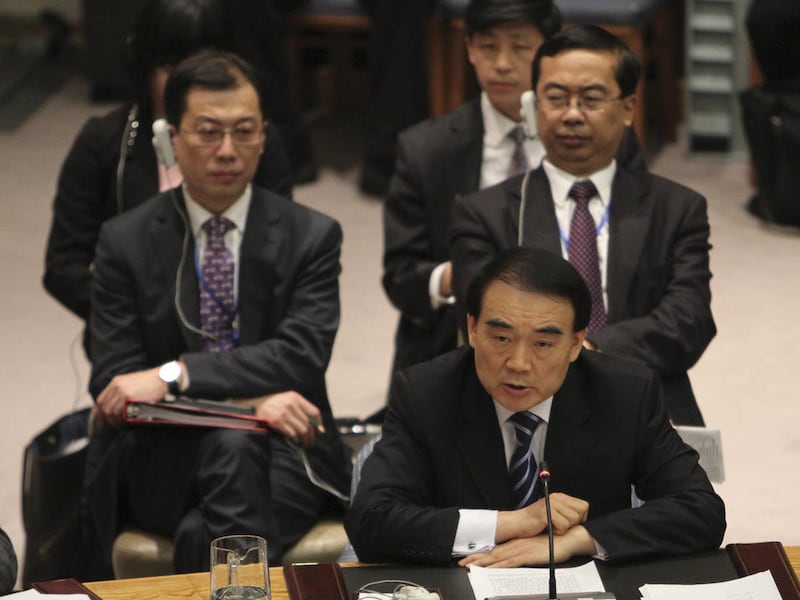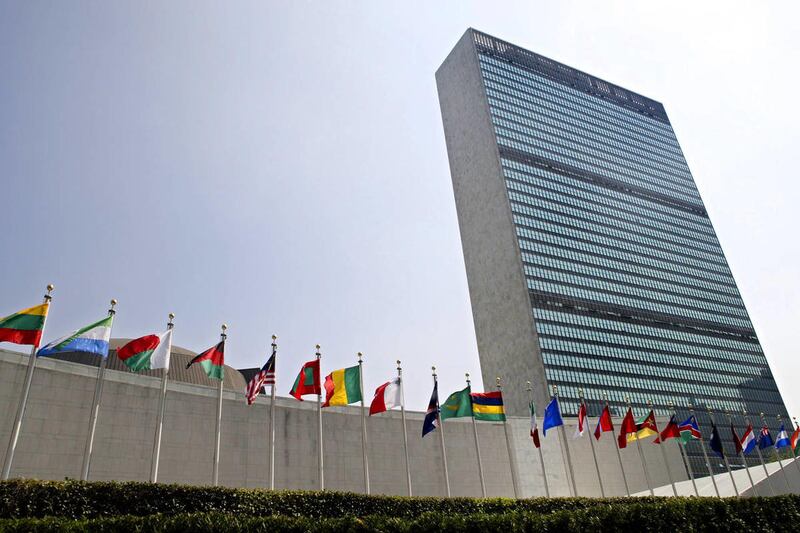On Oct. 25, 1971, the United Nations voted to expel the Republic of China, located on Taiwan, and replaced it with the People's Republic of China, the communist state based on mainland China and dominated by Mao Zedong.
World War II saw a three-way war play out in China. On one hand, there was the Japanese invader, who succeeded in conquering much of coastal China and had managed to dominate significant portions of inland territory. The legitimate Chinese government was the Republic of China, led by Chiang Kai-shek, an able, democratically elected president, though his regime often proved corrupt. Also fighting the Japanese, and just as often the Republic of China, was the Chinese Communist Party, led by Mao.
The end of World War II saw the Japanese defeated and expelled from China. The communists and Chiang's regime, often known by the name of his political party, the Kuomintang, began to fight each other with a new fervor. By 1948, the Chinese currency, which had been necessary to fund the Kuomintang's war against the communists, had become so devalued as a result of overprinting that it became virtually worthless. Similar to the way in which Germans of the Weimar era became desperate when hyperinflation set in, so too did the Chinese people hope for a more capable government to stabilize the currency.
This brought many Chinese over to the communist camp. After a series of military victories, Chiang realized that his position had become untenable. In late 1949, the legitimate government of China fled the mainland and set up shop on Taiwan. The communists declared the People's Republic of China on Oct. 1.
What has followed for decades is the problem of the two Chinas: The legitimate, democratic, though often corrupt Republic of China on Taiwan, and the communist People's Republic of China representing the mainland and the most populous nation on Earth.
Diplomatic problems immediately followed. Which China would be recognized in the new United Nations organization, set up only a few years before? China was not only a member of the U.N. General Assembly, it held an important post alongside the United States, the Soviet Union, Great Britain and France as a permanent member of the powerful U.N. Security Council, the only body within the U.N. with the authority to authorize (or veto) the use of armed force.
The position of the United States and most Western nations was clear: Chiang's government on Tawain remained the legitimate representative government of China, and would retain its seat in the U.N. and on the Security Council. The Soviet Union, itself a communist nation, protested this snub to its emerging communist ally, and in 1950 boycotted the U.N. altogether. (This proved a disaster for the Soviets as they were not present at the Security Council to veto the use of force against North Korea during the Korean War.)
Still, the Soviets and their Eastern European allies would not let the issue of Chinese representation in the U.N. die. Every year, Eastern bloc nations attempted to vote on this issue in the hopes of granting representation to their Chinese socialist brothers.
The position of the United States remained hostile to the communist regime in China, many politicians frequently referring to it derisively as “Red China.” During the Red Scare of the early 1950s, many blamed U.S. President Harry Truman for “losing” China to the communists, as though the Asian nation was the United States' to lose. A powerful Chinese lobby emerged in America, anti-communist and dedicated to the protection of the Republic of China on Taiwan.
Among those Americans dedicated to anti-communism and a confrontational position toward Mao's China was 1964 presidential candidate Barry Goldwater, and future president of the United States Ronald Reagan. The late 1950s also saw the emergence of the John Birch Society, an anti-communist movement that took its name from an American military officer and missionary who had been murdered by Chinese communists at the end of World War II.
By 1970, the United States was engaged in the Vietnam War. President Richard Nixon and National Security Adviser Henry Kissinger had been developing a diplomatic strategy to end the war and bring American troops home. Part of that strategy called for a thawing of relations with China, in the hopes that it could put pressure on the North Vietnamese to end hostilities, as well as on the Soviet Union, whose relationships with communist China had become strained. Kissinger made a secret trip to China to meet with Zhou EnLai, the communist head of state, in the summer of 1971.
In the book, “Nixon and Mao: The Week That Changed the World,” historian Margaret MacMillan wrote: “In Nixon's first couple of years in office, when he was questioned about American policy on China's representation, he merely said he had no plans to change American policy on the issue 'at this time.' In fact, he was gradually modifying his long-standing opposition to having the People's Republic in the United Nations. This was largely because of his moves toward the People’s Republic but also because it had become clear that the United States was about to lose the vote at the U.N.”
During this initial talk, Kissinger and Zhou discussed many topics of interest to both countries, as well as the possibility of Nixon visiting China sometime in the future. The mission was kept secret lest it spark outrage from the China lobby in the United States.
Nixon, with his strong history of anti-communism (he had prosecuted communist spy Alger Hiss, he had gone toe-to-toe with Soviet Premier Nikita Khurshchev in the Kitchen Debates, and had frequently denounced communism at every opportunity) was convinced that he had the credibility among America’s right wing groups to successfully talk to the Chinese communist without looking like he was caving in to them. (As Mr. Spock said in “Star Trek VI: The Undiscovered Country”: “Only Nixon could go to China.”) Still, the issue of Chinese representation in the U.N. remained a point of contention.
More and more Western nations felt that not allowing the People's Republic of China to be seated in the U.N. was not only becoming politically inexpedient, it was also foolish — the largest nation on Earth had no voice in the international organization. As states like the United Kingdom and France wanted to begin trade and have better relations with communist China, they began to shift their position on the issue.
Kissinger and Nixon sensed that the U.S. was increasingly on the losing side of the issue of Chinese representation at the U.N., and Kissinger proposed a deal during his secret mission to allow for representation of both Chinas in the U.N., but neither Zhou nor Chiang, still running the show in Taiwan, accepted it.
In the U.N. that summer, American ambassador to the U.N. and future president George H.W. Bush fought vocally against the proposition of a change in China's representation. The American diplomats in New York found themselves often without clear instructions on the debate, thanks largely to Nixon's public opposition to the change, but his private hope that such a change would signal better relations between the U.S. and communist China. Nevertheless, the diplomats worked tirelessly behind the scenes to make certain that they would have the votes they needed in the face of so many Western defections.
Then, in October, the news broke that Kissinger was visiting China. His second mission to Beijing was not kept secret, and effectively torpedoed any hope for Taiwan's continued representation in the U.N. MacMillan quoted one American diplomat who said, “So that was the coup de grace. If there was any lingering possibility that we could hold a line, that pretty well ended.”
Kissinger's public visit to China signaled to the world that the United States' position toward China was softening, whatever Nixon said publicly. In the evening of Oct. 25, just as Kissinger was preparing to leave China, two votes were taken at the United Nations headquarters in New York. By a simple majority, the People's Republic of China was granted a seat in the General Assembly and on the Security Council. The second vote expelled the Republic of China from both. Many delegates from nations around the world danced on the floor of the General Assembly when the vote was completed.
MacMillan wrote: “Nixon told the press he was 'outraged' at the display, but privately he was relieved that the issue had finally been resolved. He instructed Kissinger and (White House chief of staff H.R.) Haldeman to tell conservatives such as Ronald Reagan and Barry Goldwater that the administration had fought as hard as it could to keep Taiwan in the U.N.”
Mao and Zhou were delighted with the turn of events. The People's Republic of China would be recognized as the legitimate government of China, representing the most populous nation on Earth. Despite improving relations with the United States and a scheduled visit from Nixon for the next year, Mao let it be known to his followers that communism and capitalism remained implacable enemies.
In the book, “Mao: The Unknown Story,” biographers Jung Chang and Jon Halliday wrote: “Before China's delegates left for the U.N., Mao made a point of reminding them that they must continue to treat the USA as Public Enemy No. 1, and fiercely denounce it 'by name, an absolute must.' He wanted to make his debut on the world stage as the anti-American champion, using the U.N. as a new platform.”
Cody K. Carlson holds a master's in history from the University of Utah and teaches at Salt Lake Community College. An avid player of board games, he blogs at thediscriminatinggamer.com. Email: ckcarlson76@gmail.com


